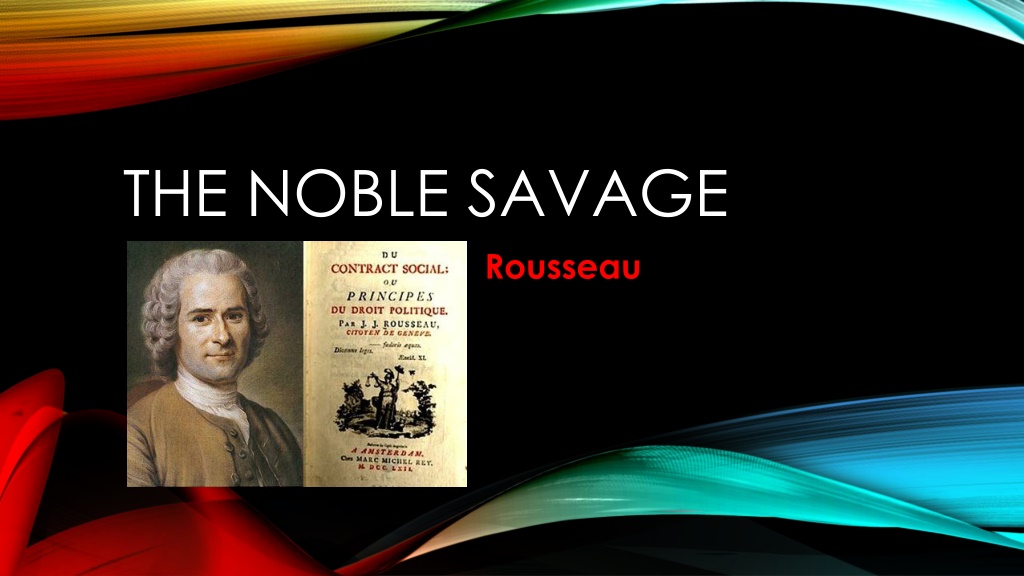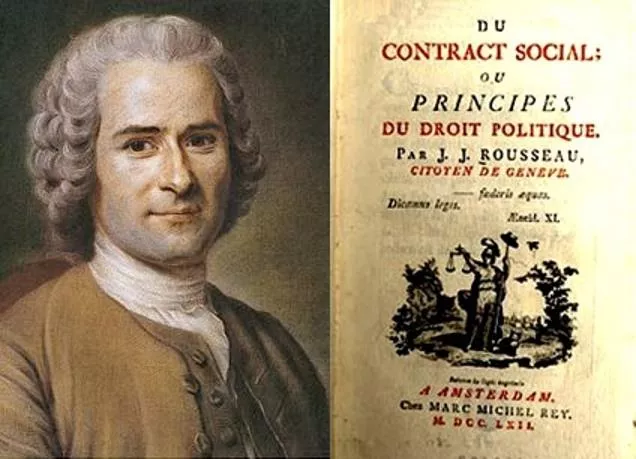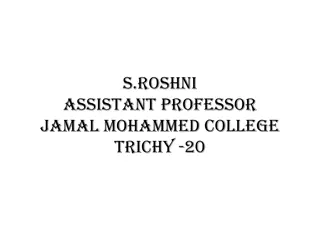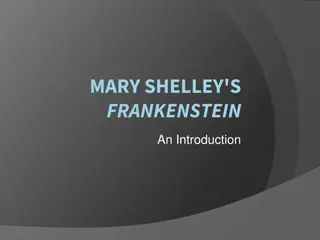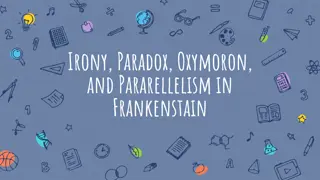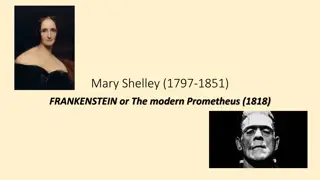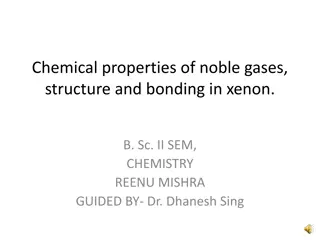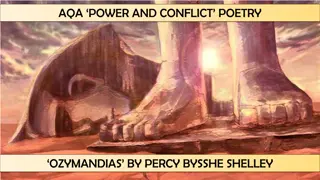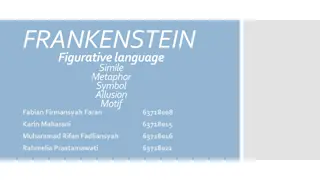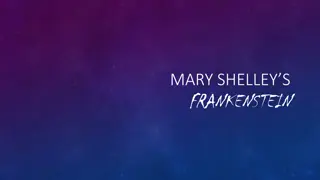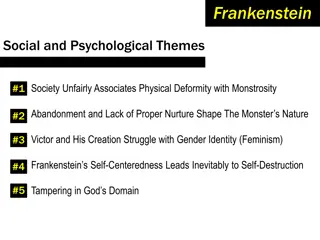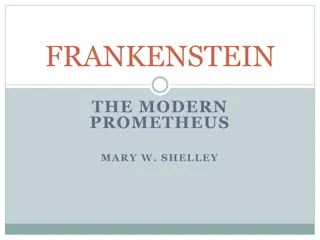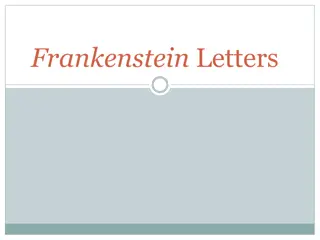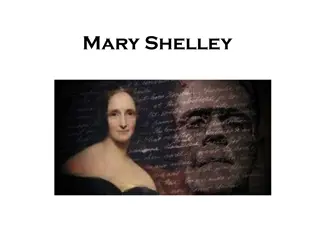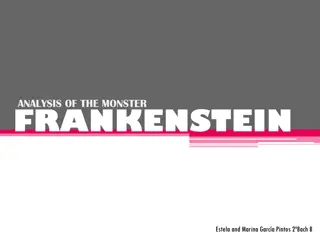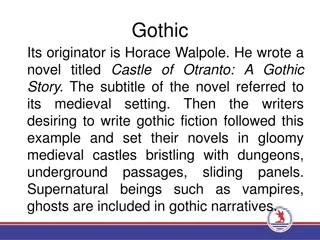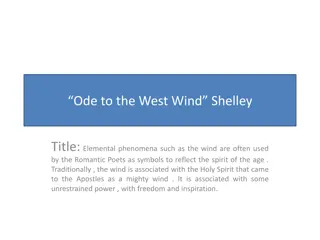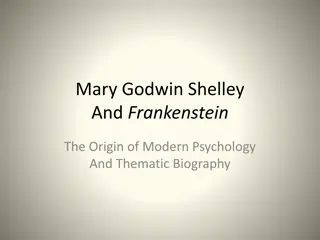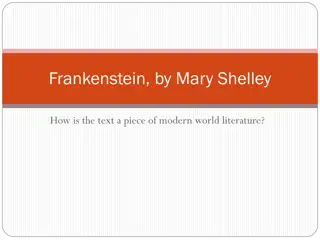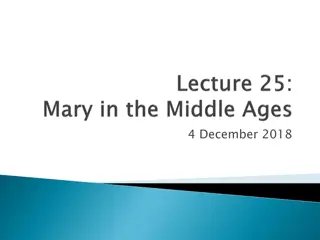The Concept of the Noble Savage in Frankenstein by Mary Shelley
The concept of the noble savage, popularized by Jean-Jacques Rousseau and reflected in Mary Shelley's novel Frankenstein, explores the idea that humans are inherently good in their natural state. Shelley portrays this through the creature, who, despite his primitive nature, displays love and kindness. The creature's reflection on his own appearance highlights the impact of society's perception. The narrative also reflects the shift from Enlightenment to Romanticism in Shelley's time, exploring themes of nature, civilization, and human origins.
Download Presentation

Please find below an Image/Link to download the presentation.
The content on the website is provided AS IS for your information and personal use only. It may not be sold, licensed, or shared on other websites without obtaining consent from the author. Download presentation by click this link. If you encounter any issues during the download, it is possible that the publisher has removed the file from their server.
E N D
Presentation Transcript
THE NOBLE SAVAGE Rousseau
The concept of the noble savage, popularized by Jean-Jacques Rousseau, largely influences Mary Shelley s novel, Frankenstein. Rousseau contends that in a state of nature, man is inherently good and can only be corrupted by the evils of society. Shelley s accord is clearly represented through her own noble savage, Frankenstein s creature. After escaping Victor s apartment, the creature takes up residence near the cottage of a banished family, the De Lacey s. Here the monster is at his most savage ; he has not yet learned to speak and does not understand human customs. While in this primitive, unknowledgeable state, the creature observes the De Lacey s, noting that the gentle manners of the family [entice his] love . As he continues to observe them he [longs] to join them, desires their love and respect and performs simple kindnesses for them, like gathering firewood and clearing snow from their walk. Shelley s agreement with Rousseau is clear; her creature is most noble even at his most savage. His behaviour and knowledge are extremely primitive, yet he feels love and kindness for these perfect strangers. Shelley believes that all men, even the most primordial, are inherently good.
how was I terrified, when I viewed myself in a transparent pool! At first I started back, unable to believe that it was indeed I who was reflected in the mirror; and when I became fully convinced that I was in reality the monster that I am, I was filled with the bitterest sensations of despondence and mortification. Alas! I did not yet entirely know the fatal effects of this miserable deformity the creature
The time in which Mary Shelley was writing was one of great change both scientifically and religiously, with the movement from Enlightenment to Romanticism there was much interest in scientific subjects and other explanations of human origins than from what is described in the bible. This is also linked to the idea of the noble savage and the creature as the embodiment of the idea. The creature is at one with nature and has no immoral thoughts, he is even a vegetarian. The creature is only affected by the other vices of men once he starts to learn of the culture and no longer rely on his senses to teach him. The industrial revolution would have had a major impact on the writings of the Romantics as it gave a new view towards nature and in particular the native people of new countries such as Australia and America. They were seen as Enlightened because they had no use for money or machines and they were seen without the obvious sins of the western people such as greed and jealousy. They were, however, seen as savages as they had not moved on and developed as a society from the beginning of the human race, they still behaved like animals, and went out hunting with spears and bows and arrows. Yet they were seen as noble people because of the attitudes they had towards the world.
Like Rousseau, Shelley also believes that civilization and knowledge can corrupt men and strip them of their goodness. As the creature learns more of the history of the world s bloodshed from the De Lacey s, he at first feels ardor for virtue and abhorrence for vice . Though he detests war and violence, the creature is now aware of the evils of the world; some of his goodness is replaced with this knowledge of evil. Later, the creature discovers Victor s journal, and after learning that his creator loathes him, he becomes a miserable and wretched outcast, worse off than Satan, because even Satan had his companions . Devastated and alone, the creature s goodness seeps out of him; he begins to question if there is any human in the world who will pay him any kindness. In a last attempt to gain friendship and love, the creature later presents himself to the De Lacey s, but upon being beaten and rejected by them, he [declares] ever-lasting war against humans (131). The noble savage has come full circle; he learns of the evils of the world, he discovers his creator s abhorrence for him, and his only human contacts reject him. The creature goes on to murder one child and frame another for his death. The creature s actions could not represent Shelley s views on the noble savage more clearly: men are inherently good only at their most primitive; the moment they begin to become civilized, evil exists deep inside of them and has the potential to escape.
